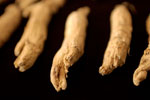 I wrap up my look at the different natural aids for type 2 diabetes with your best herbal cure. Deep from the annals of natural medicine, you know it by the name of ginseng. And the evidence is quite promising.
I wrap up my look at the different natural aids for type 2 diabetes with your best herbal cure. Deep from the annals of natural medicine, you know it by the name of ginseng. And the evidence is quite promising.
Ginseng’s effect in lowering blood glucose is based on its ability to stimulate insulin secretion, improve glucose disposal, and block glucose absorption in the gut.
It has several sources. Asian ginseng, a.k.a. Panax ginseng, hails from northern China, Korea, Japan, and Russia. American ginseng is grown, not surprisingly, in the U.S.
Two studies report a lowering of HbA1C in type 2 diabetic patients after ginseng supplementation. (If you’ve been following my series, you know that HbA1C is a kind of measurement that illustrates one’s average blood glucose level in the previous nine months.)
In one study, 36 patients with type 2 diabetes were randomly assigned to receive ginseng (100 or 200 milligrams [mg] a day) or placebo for eight weeks. Here are this study’s results on ginseng:
— The 200-mg dose reduced HbA1C by 0.5%
— It lowered fasting blood glucose by 0.9 millimoles per liter (mmol/L)
— It improved mood and psychophysical performance
— It reduced body weight by 1.9 kilograms
In another study, 24 patients with well-controlled type 2 diabetes (HbA1C: 7.1%) were randomized to receive one gram of American ginseng or placebo three times a day for eight weeks. This study shows that ginseng significantly lowered HbA1C compared to placebo. Fasting blood glucose dropped by 0.95 mmol/L. Systolic blood pressure was significantly lowered by 5.6 more millimeters of mercury (mm Hg) than placebo group.
Overall, the evidence is promising, but we should approach ginseng’s use for type 2 diabetes cautiously. The usual dose of Panax ginseng is 200 mg of extract taken twice daily. Adverse effects are rare when regular doses are taken. On occasion, women complain of breast tenderness, menstrual abnormities, or postmenopausal bleeding. Mild blood pressure elevated and insomnia have been reported, which may be due to other involved herbs or caffeine.
My final thoughts on this entire series: preliminary evidence that requires future confirmation suggests that the effect of some of the dietary supplements I’ve looked at on HbA1C in type 2 diabetes is quite encouraging, as they lower HbA1C in a manner comparable to or even better than the antidiabetes drugs currently available.
Here are the previous articles in this series:
An Inside Look at Diabetes
How Effective Are Drugs for Diabetes?
The Ultimate Mineral for Diabetes
Should You Take Cinnamon for Diabetes?
How to Fight Diabetes with Fiber
Can Magnesium Fight Diabetes?
Little-known Mineral Cure for Diabetes
Should You Take Vitamin E for Diabetes?
